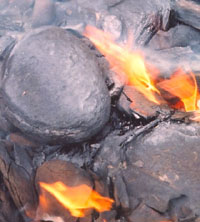
Photo from wikipedia
After demethylation, eucalyptus pyrolysis oil has higher reactivity with formaldehyde in alkaline media than the raw oil. The objective of the present work was to evaluate the effect of adding… Click to show full abstract
After demethylation, eucalyptus pyrolysis oil has higher reactivity with formaldehyde in alkaline media than the raw oil. The objective of the present work was to evaluate the effect of adding polymeric diphenylmethane diisocyanate (PMDI) on a demethylated oil-based adhesive. Chemical composition of pyrolysis oil was determined by gas chromatography/mass spectrometry. Before and after demethylation, the eucalyptus pyrolysis oil was analyzed by carbon-13 nuclear magnetic resonance spectroscopy (13C NMR) and matrix-assisted laser desorption ionization-time of flight (MALDI-TOF). Demethylated oil-based adhesive was analyzed by MALDI-TOF. Plywood panels were produced with adhesives supplemented with 0, 4, 8, 16 and 20% PMDI and an extra treatment applying a reference phenolic adhesive. The experiment encompassed six treatments with four replicates, totaling 24 panels. As demonstrated by nuclear magnetic resonance analysis, the demethylation reaction was effective in removing methyl groups from the methoxyls of syringol and derivatives, turning them, respectively, into pyrogallol and its derivatives. PMDI was effective as a cross-linking agent, enhancing the mechanical performance of the original demethylated-pyrolysis-oil adhesive. In dry condition and after boiling test, plywood manufactured with formulations adding 16 and 20% PMDI had shear strengths statistically equal to panels bonded with the reference phenolic adhesive.
Journal Title: Wood Science and Technology
Year Published: 2019
Link to full text (if available)
Share on Social Media: Sign Up to like & get
recommendations!